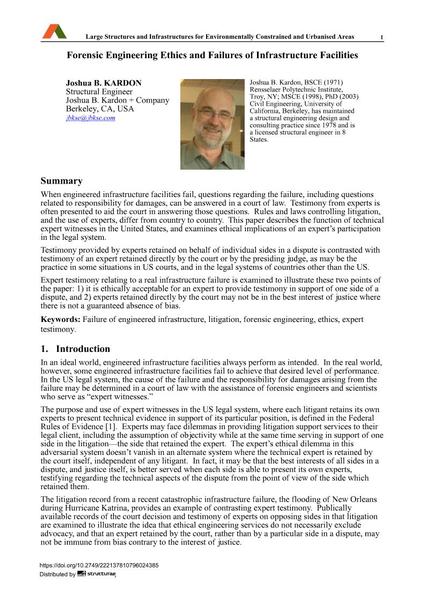Forensic Engineering Ethics and Failures of Infrastructure Facilities

|
|
|||||||||||
Bibliographic Details
| Author(s): |
Joshua B. Kardon
|
||||
|---|---|---|---|---|---|
| Medium: | conference paper | ||||
| Language(s): | English | ||||
| Conference: | IABSE Symposium: Large Structures and Infrastructures for Environmentally Constrained and Urbanised Areas, Venice, Italy, 22-24 September 2010 | ||||
| Published in: | IABSE Symposium Venice 2010 | ||||
|
|||||
| Page(s): | 242-243 | ||||
| Total no. of pages: | 6 | ||||
| Year: | 2010 | ||||
| DOI: | 10.2749/222137810796024385 | ||||
| Abstract: |
When engineered infrastructure facilities fail, questions regarding the failure, including questions related to responsibility for damages, can be answered in a court of law. Testimony from experts is often presented to aid the court in answering those questions. Rules and laws controlling litigation, and the use of experts, differ from country to country. This paper describes the function of technical expert witnesses in the United States, and examines ethical implications of an expert’s participation in the legal system. Testimony provided by experts retained on behalf of individual sides in a dispute is contrasted with testimony of an expert retained directly by the court or by the presiding judge, as may be the practice in some situations in US courts, and in the legal systems of countries other than the US. Expert testimony relating to a real infrastructure failure is examined to illustrate these two points of the paper: 1) it is ethically acceptable for an expert to provide testimony in support of one side of a dispute, and 2) experts retained directly by the court may not be in the best interest of justice where there is not a guaranteed absence of bias. |
||||
| Keywords: |
forensic engineering ethics Failure of engineered infrastructure litigation expert testimony
|
||||
